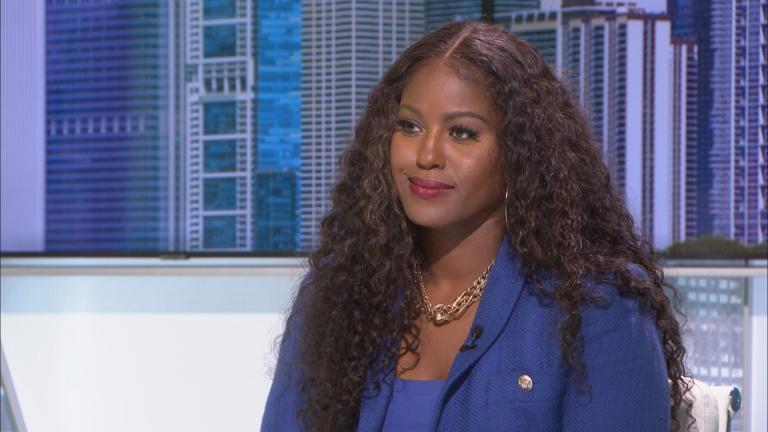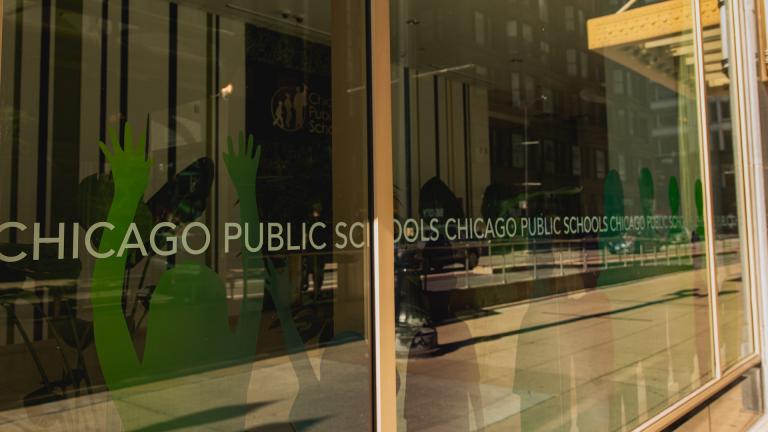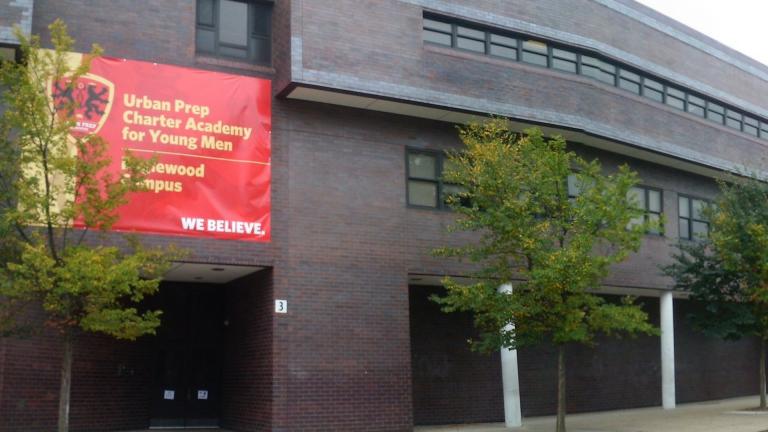Chicago Public Schools saw significant academic improvement this year with third through eighth graders achieving a five point increase in both language arts and math on state assessments, surpassing pre-pandemic marks.
This achievement comes as the district grapples with substantial fiscal challenges, including a nearly $400 million budget deficit and the delayed release of the 2025 district budget. Amidst these financial hurdles, the Chicago Teachers Union is due for a new contract and recently held its first-ever public bargaining session with CPS on a “Green Schools,” eco-friendly initiative.
CPS CEO Pedro Martinez appeared on “Chicago Tonight” to discuss the current state of CPS.
WTTW News: Let’s start with the assessments. The latest state assessments show major progress in both English and math. Third through eighth graders saw a five point increase from last year with higher proficiencies than pre-pandemic times. What do you attribute all this to?
Pedro Martinez: Well, first of all, I’m so proud, Brandis, of our staff and our students. As you said, for the first time since the pandemic started, we’re now at exceeding pre-pandemic levels in reading, and we know that reading is foundational for all of our students. We are seeing some great investments and we’re seeing the results from that. We have intervention teachers at our schools with the highest poverty rates; we have seen our Black students have the biggest gains in our district by six points.
These are schools that didn’t have sufficient resources in the past. In addition, we also are seeing results from our tutors; we have after-school programs across the district. And of course, like I said, just the hard work of our teachers and students.
That’s 6% for black students. That is a large leap, 6%, which indicates to me that they had some room to grow, that there was a lot of room to grow. So all of that said, 31% of students being proficient in English Language Arts, that still means that 69% are not proficient. What’s the plan to continue the progress, this growth that you’ve seen?
Martinez: Yeah, no, absolutely. So I think one of the things I know is that this year’s gains build on last year’s gains, which also saw a six-point gain in reading and a two-point gain in math. And we know from a study from Harvard and Stanford that we are number one in the country in reading recovery, number one in reading recovery for Black students and number two for Latino students in the country, so this builds on these gains.
The other context I would give you is that our state proficiency rate, they were at 35% in reading and 27% in math. Our state overall also doesn’t have high ratings, but remember, we have a very rigorous assessment. More importantly, what I saw was students across every grade level growing. So as we see this growth, we also have to remind our community that our high schools right now couldn’t be stronger. We’re seeing record graduation rates, record scholarships, record number of college credits being earned. So as I tell our high school principals, imagine as these students move on through high school, we’re gonna see even stronger results.
Last week, the district announced that the CPS budget for the 2025 fiscal year would be released in July instead of last Wednesday, which was the original plan. Why the delay?
Martinez: We want to really firm up our budget. One of the things that we said, Brandis, is again, to protect the gains that we’re seeing. We wanted to protect the investments at our schools. We worked with our principals to make some tough decisions, and so we’re finding efficiencies and reductions in our central office.
We want to make sure that we firm those up. I will tell you that I feel confident that we’re going to have a balanced budget for the July board meeting. We are going to be able to stave off the cuts from the schools. It does mean though, that we’ll have some challenges centrally, plus, we’re still going to have some more challenges in the coming year.
Some of those challenges are, of course, that $400 million budget deficit. Are there any specific measures that are being considered to address this deficit without compromising the quality of education for students?
Martinez: I really am grateful to our partners, whether it’s our vendors or other partners that we have. We’ve asked them to give us concessions, and we’ve asked them to give us savings. We found deficiencies, we’re doing a hiring freeze across the district as well, so we’re making some tough decisions but we’re also trying to preserve our core services because the challenge that I have right now is that we’ve made so many investments in our schools, and we just need a certain level of infrastructure to be able to maintain that.
What I love is that our team is really working together to make sure that our schools are protected. Because again, we’re seeing the evidence in the student gains.
It feels like we’ve been here before with CPS, before your time with a massive budget deficit. I remember it was about a billion dollars maybe seven or eight years ago. Then of course, the state passed the evidence-based funding model with a ramp to fully fund that. We’re not there yet, but that’s supposed to happen over time. And the district received a lot more money during the COVID years. That money is starting to run out. Why are we here again?
Martinez: One of the things we did is we phased in the federal funding over three years, so year three is next year. We’ve had a structural deficit of $600-700 million a year. It’s about half of that — $400 million — for next year. That’s as we have the last tranche of federal funding that we’re going to have, so that’s why the deficit will be bigger in 2026. The main issue is that, and our state has done a great job in adding funding, but as I said publicly, our needs are outpacing the funding we’re getting from the state. I have more students than ever that need IEPs that require special services. We have more migrant students than ever. In fact, our enrollment is actually up — we’re almost at 329,000 students as we finished last year. That’s up from 323,000 from the year before. So for us, we’re seeing more students, more needs, and the funding just is not keeping up.
We also know that the state, even from their own funding formula, they’re short about a billion dollars, with a “B,” just for Chicago alone. Again, this is not a problem that our leaders in the state created — they inherited (it), but I really want to work with them because we are seeing the evidence of what could happen when we invest in our district.
You mentioned that 6,000 student growth this year over the year before. To what do you attribute that?
Martinez: So two things we’re seeing, Brandis. One is that our enrollment is stabilizing, so we’re seeing the least amount of students from every group leaving us. In the past, we’ve seen large numbers of our Black students and Latino students leaving us. We’re not seeing that anymore. So we saw stabilization just in time for us to receive thousands of migrant students — many of them are very mobile, but they’re also staying in our city. So because of that, we’re seeing increased enrollment.
I want to shift a little bit to negotiations because, of course, the CTU contract with the district expires at the end of this month. Last week you held your first ever public bargaining session. CTU has been calling for open negotiations for some time. Why did the district agree to them this time?
Martinez: There’s so many complexities in our school district — whether it’s our budget, the priorities that we have and why we’re making the investments we’re making. And one of the things that’s always a challenge is: How do I explain that to families? We have a large multi-billion dollar budget. We have so many schools, we’re so large. My hope is that in this partnership, we can hear both what the concerns are of CTU as well as what our response is. And also, what is it that we prioritize.
What are the district’s main priorities going into negotiating?
Martinez: A few things, Brandis. First of all, I am so proud that over time now, we have one of the highest pay schedules for teachers in the country. We have one of the highest starting salaries. Our average teacher salary is over $100,000. I want to make sure we continue to invest in our staff and teachers. I’ve seen the benefits of having less teacher turnover. We don’t have the shortages that other districts have. That’s one example.
Another is making sure we protect the supports for both our teachers and our students. We have academic coaches; we have intervention teachers and tutors — one of the things that we know is making a difference based on our recent results. Then of course, we want to continue to invest in enrichment like the fine arts and sports programs. These are all priorities for us. So I am hoping that we can find common ground with our CTU partners, but these are just a few examples of the areas that we’re seeing, as well as making sure that our children have access to strong instruction and strong content.
Before we let you go, candidates today began filing for ballot positions for the Chicago Board of Education. That election is in November. You have served with elected school boards in the past. What can we expect to be different?
Martinez: It’s been my history, as you know, this is my third superintendency. What I’m looking forward to is just meeting our new board members in January, finding advocates that will actually go and speak about our district and what’s happening. In addition, it’s a great way for us to know what’s going on in the ground in the community. So, I’m going to be optimistic that it’s going to create a new sense of energy. I look forward to the district, frankly, becoming more independent.








